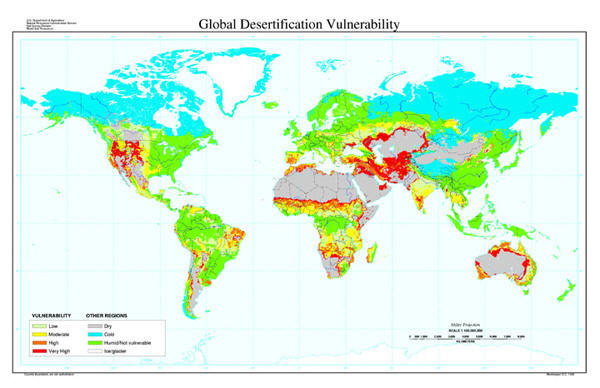Desertification around the worldThe United Nations Conference on Desertification ranks desertification hazard on the basis of a drop in agricultural productivity:
Desertification is a global problem occurring in many places but is prevalent along the margins of semiarid and arid lands in Asia, central Australia, portions of North and South America, and Africa. A world map prepared by the United States NRCS shows just how widespread the problem is.
Figure DD 13.3 Desertification Vulnerability Africa has been significantly impacted by
desertification. Almost three quarters of Africa's agricultural
drylands are already degraded to some degree. The impact on
desertification on the greatest number of people occurs in Asia.
Degraded regions include the sand dunes of Syria, the eroded
mountain slopes of Nepal, and the deforested and overgrazed
highlands of Laos. The Northern Mediterranean region is the cradle
of civilization and has borne the effects of poor agricultural
practices. Salinized, infertile soils are the result of natural
hazards e.g. droughts, floods and forest fire, as well as
overtilling and overgrazing. Soil degradation is high through much
of Central and Eastern Europe, and very high in some areas, for
example along the coast of the Adriatic Sea. Poor irrigation
practices and the unsustainable exploitation of water resources are
contributing to chemical pollution, soil salinization and aquifer
depletion. Nearly a quarter of the inhabitants of Latin America and
the Caribbean live below the poverty line fueling practices that
lead to land degradation. Erosion and water shortages are
intensifying in many East Caribbean islands. |
